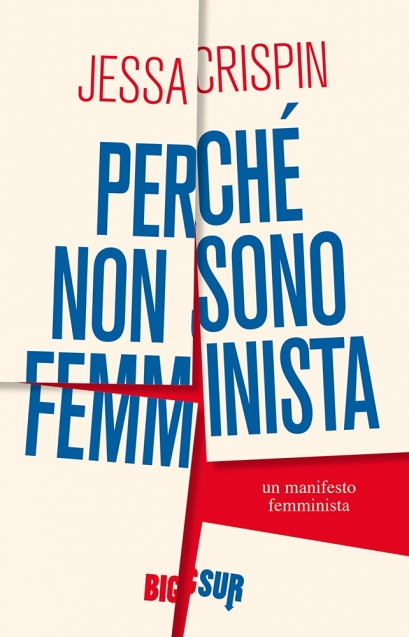Ennio Flaiano , in The Solitude of the Satyr , proposes a brilliant idea to make communism ineffective in a country like ours, of parliamentary democracy. It’s Marx’s egg. It would be enough to teach communism in schools. In that case it would not be necessary to believe, but only to know, to study, and since the students will have to work hard to pass the mandatory exams in the subject of communism, it will be hated from the beginning, and in the end the ranks of the party itself will be thinned out. And the more the matter is simplified in the vain attempt to save it, the more communism will become a matter that is not scary, thus communism itself will also cease to be scary.
This is the mechanism that Jessa Crispin describes to us in the 2017 essay Why I’m Not a Feminist ( SUR ). Commonly, if you believe that women are human beings and deserve to be treated as such and have the same rights and freedoms afforded to men, you are a feminist, or so all those who claim to be continue to claim. Crispin not only says he isn’t, but she twists her mouth in disgust at this implication. All the reassurances that feminists are careful to make towards men so that they are not afraid of them, because they first of all do not identify with feminists like Andrea Dworkin or other extremists, are evidence that at a certain point on the path towards women’s liberation it was decided that the most effective method of rendering feminism harmless was to universalize feminism. But rather than creating a world and a philosophy capable of appealing to the masses, a world based on equity, community and the exchange of ideas, feminism itself needed a makeover to be more appealing to contemporary audiences, both male and female. female. The feminism Crispin talks about, however, does not foresee a gradual change that in the end leaves everything as it was and even worse. It is a purifying fire. Crispin wants to completely dismantle that system and replace it with another, and she refuses to associate herself with a feminism foolishly focused on self-empowerment .

Feminism, before it became what it is today, was always carried forward by a small number of radical women – such as Catharine MacKinnon, Shulamith Firestone and Germaine Greer, who through their hard work allowed others to advance. Most women have benefited from the work of these few, often trying to distance themselves from them due to their extreme ideas, such as the demonization of porn. The shift in focus from society to the individual has meant that feminism has become an identity politics, focused on individual achievement and dividing us into smaller and smaller groups, catering to the middle class white woman, and leaving middle class women behind. a different ethnicity and religion. Women found themselves increasingly alone, with all their worries and energies turned inward rather than outward. This same process of simplifying feminism into something bland and Disney-esque has caused women to distance themselves from the movement. And feminists believe that the best way to convert women who turn away from feminism is to make women accept the label and identity, rather than making them see the monstrosity of the world and their role in the world. In other words, women are part of, create patriarchal culture. They obediently submitted to it at first, and when they managed to penetrate the system they perpetuated it, assuming positions of power. Having power just meant having freedom of choice, and feminists insist that you can be a feminist and still shave your legs, fuck men, consume misogynistic culture. They do it, so you can too. They do not question the kind of choice feminists should make to define themselves as feminists as long as having the power to choose is enough. They believe that calling yourself a feminist is enough to have a better life, turning it into yet another badge on your jacket, yet another bumper sticker. The internal contents remain unchanged.
«Shirking the value system and objectives of the dominant culture will always be a dramatic and uncomfortable act. Facade feminism – a feminism that requires only changing labels, without any real reform – does not demand anything so arduous of women. To understand what contemporary superficial feminism is really like, just note that the most common indicators of its success are identical to that of success in patriarchal capitalism. That is, money and power. Our criteria is how many women are CEOs of large companies, how many bylines in the New York Times are women, what is the percentage of medical graduates.”
The behaviors of illustrious women, who would have been condemned by feminists if only they had belonged to the opposite sex, take a back seat.
Women who don’t want to be feminists, and who in fact don’t have to be, are not necessarily lazy, deluded, greedy, stupid, uneducated, lower class, evangelical Christian, rich and spoiled mothers. Women were not allowed access to power, but at the same time they always worked; many were forced to do so, doing the most menial and humiliating jobs. Historically, some women have had an escape from work: men. If they found the right man, they could abandon that alienating world of work and take refuge in the relative comfort of home. The house may have been a prison, but can a woman forced to clean up other people’s vomit or urine be blamed if she asks to be left alone in her cell?
The needs of not only white, educated, middle-class women are overlooked, but the desires and needs of many women who do not feel represented by the movement. Many women don’t dream of working. Ultimately, not working, not participating in the system, can also be a symptom of a more noble spirit of feminism , a purer feminism, which is not interested in joining the ranks of the capital system. They might even be better than you.
This speech by Crispin is obviously provocative. It is clear that you aim to convert not the individual, but the extreme individual. Those who, even if they don’t know it yet or don’t want to acknowledge it, are as radical as and more than her. And she wants to tell all those women who pity non-feminist women just so they don’t have to attribute value to what they say, do, or believe, that they should instead see the limits of their project. Understanding that they are not as good as they think, that perhaps the unhappiness of those women is not so different from theirs.
Feminism has been corrupted by patriarchal values. Perverted in the name of greed and power. To succeed in a world of patriarchs, we had to transform ourselves into patriarchs, and therefore into men. We had no real revolutionary value to oppose them. The women who dared to do so were later downsized, chased away, and put in the pillory of shame and memory. All to secure a slice of personal power. To progress in patriarchal culture we have adapted to what men appreciate in women, namely being well cared for, sexuality, beauty. However, inconvenience is not part of the program of universal feminism. This is something to avoid if you want to attract all women. Thus, in the end, women turned out to be useful to men. It was the men themselves who encouraged us, because it was convenient for them. Men have allowed the liberation of women, just as women have always been mistakenly convinced that they had the duty or power to save men. Men have only made sure that the threat of feminism is no longer scary, and to do so they have managed to “teach it in schools”.
«This is why universal feminism will always be ineffective. Because a feminism that arises from self-interest, embraced because it offers easier access to power, will necessarily be part of this system of power and oppression, and will therefore be useless as a means to universal human rights. Women actively participate in the system and benefit from it. Once you got there, you didn’t just sell yourself, you converted.”
The conclusions Crispin reaches are interesting to read, but as often happens in these cases, the longed-for voice of Mark Fisher takes over and tells us: can you imagine a system other than capitalism, even just imagine it?
The choice between being radical feminists or supporting the patriarchy seems to boil down to this: to those who desperately cling to their living space and want to mineralize the human being, and to those who instead trust in otherworldly peace and distance themselves from the civil assembly, leaving things go to hell following their natural course. Always this: secularism or faith.
Paradoxically, women were held in much greater consideration in ancient times , when they embodied poetry, piety, love tempered by modesty. She was often dancing figures, with a moving and veiled, Canova-like sensuality: like her healed friend, the proud Antigone, the Ortisian Teresa who plays the harp or sings Sappho and the priestesses of the daughters of Venus; but women are also witnesses, martyrs capable of paying for the suffering of the world within themselves. Their beauty, a Platonic image of good, symbolized a gentle balance of allegory and physicality, but above all of pleasure and pain.
The depreciation that the woman has had may have its origin in the fact that the woman herself wanted to be considered as a man, of her own free will. Women showed what they can do – and it wasn’t a pretty sight. Men are terrified of women.
But there is a dead end in Crispin’s speech. To create an enlightened society, to revolutionize it, it is necessary to be what Ayn Rand defined as being selfish . This is the paradox. The world that according to Crispin must be created, a world of free men and women, in which patriarchy – and capitalism – is overthrown, is a world made up of individuals, and not the masses. Selfishness is therefore needed to dissolve selfishness. How would this be possible? If it was work on the individual that was necessary, why weren’t these women able to change the system that much?
In reality they have changed something, and they themselves have changed.
Before Crispin, there were voices of women like He-Yin Zhen, an early twentieth-century Chinese philosopher who incorporated issues of class and race, as well as the economic system as a whole and said: «Rather than fighting against men for power, today’s women should subvert the law of man by forcing him to give up his privileges. Thus, real equality would be established in which neither the power of women nor that of men would be asserted. In this lies the liberation of women and the radical reform of society” ( D Editore ). Liberation as the absence of power, freedom as the absence of masters. It shouldn’t be women who seek power, it should be men, engulfed, monstrous by their own ambitions, who want to strip themselves of it forever. In such a civilization of selfish and enlightened individuals a revolution is possible. A revolution depends not on a doctrine, but on a social state. It is a physical, almost geological phenomenon; it is the individual who feels alone, alone and the center of the world, who, as a resentful victim, wants to rebel and wants to destroy what has been against him. They are women and men who no longer want to be slapped. But individualism must not be sterile, it must not create men closed in the hermeticism of their individuality, powerless to come out of themselves and to love. You shouldn’t stop as soon as you reach your personal goal. Indeed, the – absolute – anxiety for justice is needed. Our opponent is the socialization of culture, blind pragmatism, rationalization, the dominance of technology.

Montaigne gave general advice to men that is well suited to these self-forgetting feminists, «Look within yourself, recognize yourself, stay within yourself; your intelligence and your will, which is wasted elsewhere, bring it back to itself; you flow away, you disperse: get back together, prop yourself up; they are betraying you, they are dispersing you, they are robbing you of yourselves.”
We need the help, against the presumption of patriarchy, of a mental asceticism, of a pedagogy, of an aesthetics. They did not see, or did not want to see, that the fight against presumption could involve the choice of sacrifice. By discarding the alternative of submission to force or martyrdom, the boundary is drawn exactly where the dominion of the hero or saint begins. Women are not expected to be better than men. Women aren’t supposed to be heroes. “They will follow the right side to the fire, but only if they can.”
Men are exhausted by fate, they have exhausted themselves in their impotence, but perhaps for women the battle has just begun . Something is created, something cold, rational, free from all passion and appetite, something definitively ascetic – and which can therefore contain everything. And it is morality: liberal morality, human morality, tiring morality of duty. To trace the seeds of feminism we must look in liberalism, not in bourgeois economic capitalist liberalism, but in human liberalism. When the moorings were severed from above, a free base had to be built – but with obligatory, essentially human strength – of the archetypal man, therefore of no man, of the exemplary individual, therefore of no individual. Now we must also include women again. This is the woman’s task, to show herself up to the level of feminine morality. Recreate. Rebuild, integrate a structured world; the return to the universe that connects woman – and man (because you cannot think of one without thinking of the other) without dissolving or chaining him. For women to save themselves – and not men! – it takes love for man. Love for values. These supreme virtues of liberalism! The spiritual aristocracy, the free intellectuality, which is the essence of cultured living. And freedom to think, to research, to teach. The problem is not personal satisfaction, but what satisfies the individual, what he dreams of, what he seeks, his values, what he would be willing to fight for that must be contested. You can’t defeat desire, but you can change what you want. Or, on the contrary, it is not what the human being believes that is the problem, but the fact that he believes. You can’t decide what he wants, it’s the desire itself that must be defeated. Or, neither personal satisfaction nor what the human desires are a problem; or the opposite. Which version convinces you the most? Because as Maria Zambrano concludes: «When the sterile reason withdraws, dried up by the struggle without result, and the broken sensitivity collects only the fragment, the detail that we are left with only one path of hope: the feeling, the love, which by repeating the miracle, you return to create the world.”
